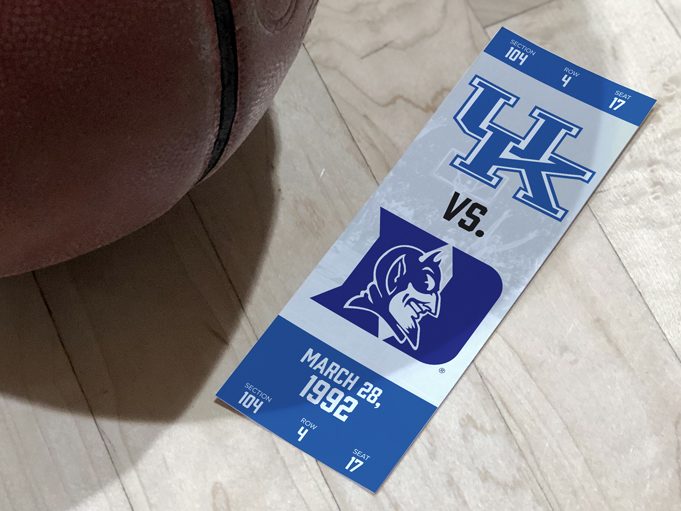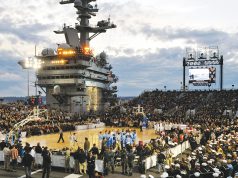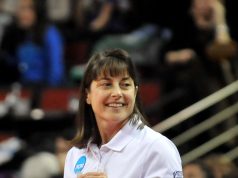As an exhausted Tom Clark settled back into the aisle seat of his Delta Airlines flight the morning of March 29, 1992, a slight sense of uneasiness was tugging at his enormous feeling of fulfillment.
The veteran official was certain he had it right the night before in Philadelphia, when he made the pivotal call in what is perhaps the most memorable game in collegiate basketball history. There was no question in his mind that Christian Laettner’s shot against Kentucky in the East Regional championship game had started its ascent a fraction of a second before the Spectrum clock expired.
Now if only Clark could be confident that the dozens of disgruntled Kentucky fans who had boarding passes for that flight to Cincinnati were as satisfied as he was. Clark estimates that at least 80 percent of the passengers on that plane were Kentucky fans, based on their apparel and personal effects, and he really didn’t care to have his presence revealed.
Just as Clark started to feel secure while cruising at 50,000 feet, he heard a voice from the passenger seated next to him.
“You were one of the three officials yesterday, weren’t you?” the man asked.
“Yes sir, I was,‘‘ a reluctant Clark softly answered.
“You had that last-second call, didn’t you? Well, I’m a reporter and we were laughing at you on press row just before that last play. We were watching you during the timeout and you kept twitching your head. You must have really been nervous.”
In reality, Clark was being professional to the extreme during that game of epic proportions. And he was rewarded with what remains the most fulfilling moment of his 22-year career as a major-college basketball official. His moment in history was set up when Kentucky’s Sean Woods arched a 13-foot shot over Laettner’s outstretched hand that banked into the basket with 2.1 seconds left. After trailing, 79-69, with 7:40 remaining, Kentucky had taken a 103-102 lead on Woods’ basket and it appeared that the defending national-champion Blue Devils were finished.
Suddenly, Clark was all by himself in a deafening arena as a national audience watched in frenzied anticipation. The crew also included Tim Higgins and Charlie Range, but the incredible weight of the game rested squarely on the shoulders of this school psychologist who lives in Sharonville, Ohio.
“When Woods made that shot, I realized I was in (the center) position,‘‘ Clark said. “I just started thinking what may transpire here. So I was standing there at midcourt – they had called a timeout – and I was thinking, ‘I may not be able to hear this horn,’ because, at that time, we couldn’t go to replay like we can today.‘‘
Perspiring so profusely that he was literally catching the sweat rolling off his face in his hands during that last timeout, Clark mapped out his strategy.
“I said, ‘I’ve got to program myself to look at the clock,’” he said. “I programmed myself and I said, ‘OK, release, clock.’ I said, wherever they release it from – and I thought it would be near midcourt – I had to program myself to look at the clock above the backboard. I couldn’t see the clock directly above.
“I kept saying, ‘Release, clock, release, clock.’ I also said, ‘No matter what, don’t call a foul unless they have to put him into the hospital.’”
And with each time he repeated “release, clock,” Clark mechanically moved his head from the anticipated spot of the shot to the clock until it was instinctive.
So much for the comical nervous twitch those on press row assumed they were seeing during that television timeout.
Expecting Grant Hill’s unguarded inbounds pass from the far endline to be lobbed to Bobby Hurley at midcourt, Clark instead saw a perfect full-court heave sail over his head to Laettner near the far free-throw line.
Leaping for the pass, Laettner dribbled once, faked right, spun left and ascended for his moment in history. After making all nine of his field-goal attempts and all 10 of his free-throw attempts at that point, Laettner struck again, making a game-winning 17-footer as time expired.
And Clark couldn’t have been more prepared.
“Laettner gets the ball and turns,” Clark said. “I’m watching for a travel, fouls, whatever. He releases the ball and I say, ‘Release, clock’ and I go right to the clock. And I thought, ‘My gosh; it’s good! There’s two-tenths of a second.’ There’s no travel, no foul and I kind of relax. I say, ‘Everything’s OK,’ not dreaming that the ball is going to go in.
“I look over at the scorer’s table and they’re all standing up. I see a couple of guys who have got their arms out like, ‘Is it good or is it not good?’ I wave it good and pandemonium breaks out. I go into the locker room and Tim sits down, he’s got his arms folded – he’s cool, calm and collected anyway – and he says, ‘Tom, was it good?’”
Clark never doubted himself. During his flight the following morning, he sensed an obvious disappointment about Christian Laettner’s shot among the Kentucky fans on that plane, but he did not hear anyone grumbling about his call.
And then, about six weeks after that game, Clark received a package from Duke Coach Mike Krzyzewski in the mail that totally convinced him that he came through in the clutch that night.
“What transpired was, a friend of mine knew Coach Krzyzewski down there,” Clark said. “And what happened is they had a picture of this shot. And on it, it’s written, ‘Dear, Tom, I’m certainly glad you got this one right – Coach Krzyzewski.’
“Guess what’s on the clock? The shot is from the end zone, the ball is fractions out of his hands and you see me glancing at the clock. Guess what’s on it? Two-tenths of a second.”
Range added, “We always say every game is a very significant, major, important game and you just approach it that way. But this game, golly, if you had to approach it on a scale of one to 10, with 10 being the highest, this is a 10-plus.”
Higgins, a man of few words, said so much in his typically succinct style.
“When I left the game,” Higgins said, “my wife was sitting in the car and I said to her, ‘I think that’s as good of a game that has ever been played.’”
What's Your Call? Leave a Comment:
Note: This article is archival in nature. Rules, interpretations, mechanics, philosophies and other information may or may not be correct for the current year.
This article is the copyright of ©Referee Enterprises, Inc., and may not be republished in whole or in part online, in print or in any capacity without expressed written permission from Referee. The article is made available for educational use by individuals.





















